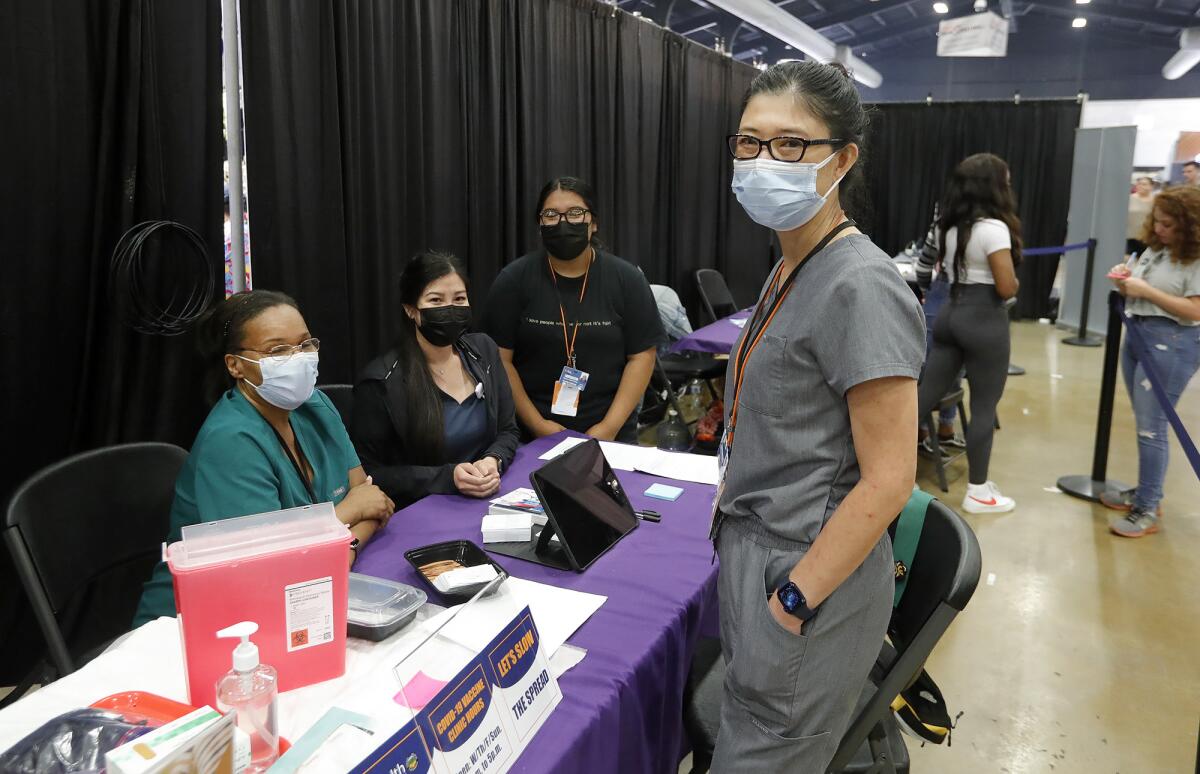Commentary: Supervisors show Orange County’s determination to take bold steps to address racial inequities

- Share via
The Orange County Board of Supervisors recently sent a clear public signal regarding racial inequities. Despite our county’s global reputation of beauty and wealth, the board acknowledged a dangerous undercurrent that’s threatened our ability to collectively thrive. Through resolution S26D, they brought racism’s damaging impact to the health and well-being of our communities of color into the “mainstream.” Across political parties, voting districts and ethnic backgrounds, they acknowledged that critical systems such as housing, education, healthcare, employment, criminal justice and more, have not been fair or equitable for our Black, Latino, Indigenous, Asian American and Pacific Islander neighbors.
During its meeting, the board adopted resolution S26D, declaring racism and inequity a public health crisis in Orange County. The resolution was submitted by Board Chairman Doug Chaffee and Supervisor Andrew Do — who represent both sides of the aisle.
While the resolution centers around public health, on so many levels, S26D is a breakthrough. It recognizes that the effects of racism and inequity are local — and can be life-ending. Whether expressed through physical or verbal attacks or unconscious bias, over time, the impact adds up to mental and physical health issues. Think depression, stress and anxiety, diabetes, heart disease, stroke and yes, death. These systemic inequities are universally linked, and until now, they’ve largely been accepted as “normal”— just the way things work.
The 2021 Orange County Hate Crimes Report, released in September of this year, reflects another year of increased hate activity in our community. The report outlines key statistics recorded during that year and shows a 165% increase in reported hate activity compared to data the county shared in 2017.
For reference, hate crimes, as defined by the California attorney general, include applying graffiti, vandalizing or setting fire to private property, physical violence against an individual, and criminal threat of violence against an individual or a group.
A hate incident is defined as distribution of non-threatening antisemitic flyers in a public place or the cowardly act of yelling racial slurs and “Black lives don’t matter,” from a passing vehicle. Hate incidents also include displaying anti-LGBTQ placards during a parade or funeral, writing a letter to an editor ridiculing people with disabilities, painting racist graffiti on a freeway overpass (police would categorize it as a crime but not a hate crime).
How much does Resolution S26D matter? Immensely. It reflects a significant shift to a greater collective mindset that our playing field is not level. Change is desperately needed, and now it’s officially being implemented.
The resolution requires a drill down on the services provided to the county’s underserved populations, ensuring that equity, diversity and inclusion are at the heart of those resources. It calls for more complete personnel training, greater public education and perhaps most important, expanded collaboration with community partners fighting racism. More frequent partnerships with the county will empower dedicated, passionate groups fighting to erase racism and inequity with new opportunities to make even more substantial and lasting change. This continued rise in hate means we’ve failed to create spaces of belonging, and that has fed the toxic systemic issues that prevent our entire society from thriving.
I remain confident and hopeful that our future together can be one that offers everyone a chance to belong, learn, access needed resources and support, grow and to live in health, peace and security.
Alison Edwards is CEO of OC Human Relations, a nonprofit working to foster mutual understanding among residents and eliminate prejudice, intolerance and discrimination in order to make Orange County a better place for all people to live, work and do business.
All the latest on Orange County from Orange County.
Get our free TimesOC newsletter.
You may occasionally receive promotional content from the Daily Pilot.



